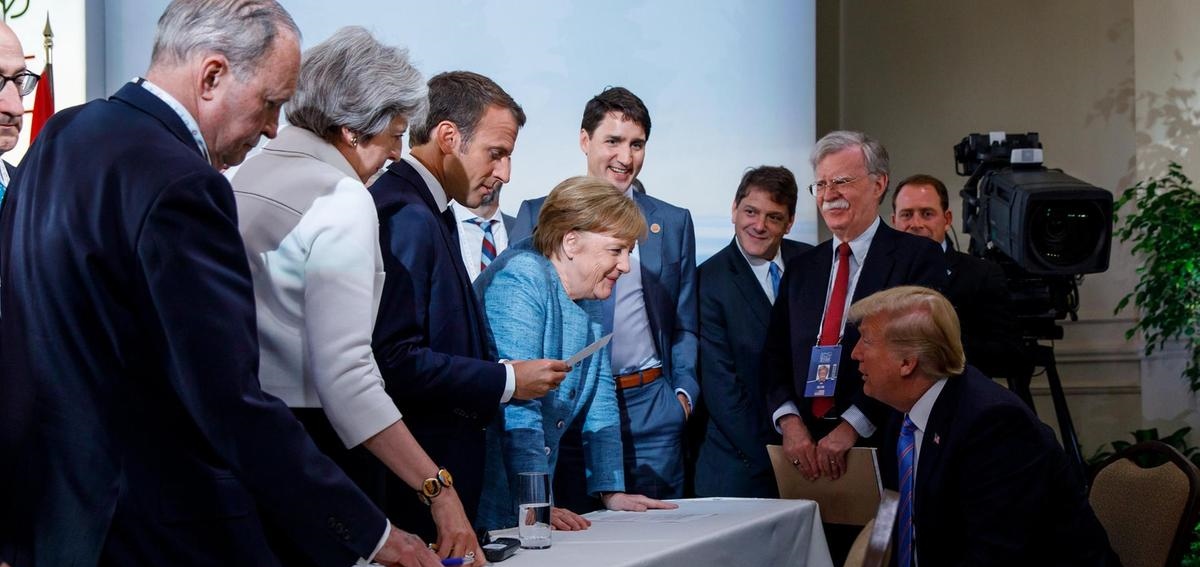G7 Summit ends in disarray
June 11, 2018 | Expert Insights

Donald Trump has left the G7 network of global cooperation in a state of pandemonium, after he pulled the US out of a previously agreed summit communiqué, and launched an undiplomatic attack on his host Canadian Prime Minister Justin Trudeau whom he described as “dishonest and weak”.
Background
G7 is an annual summit bringing together Canada, the US, the UK, France, Italy, Japan and Germany, which represent more than 60% of global net worth between them. Russia was suspended from the group in 2014 because of its annexation of Crimea from Ukraine.
Tariffs: On 1 June, the US imposed a 25% tariff for steel and 10% for aluminum on imports from the EU, Canada, and Mexico. The EU then announced tariffs on US goods ranging from Harley-Davidson motorcycles to bourbon. Canada and Mexico are also taking action in retaliation.
Communiqués: There are essentially four outcomes. The Consensus view is the best outcome when all the 7 countries agree on all subjects. The Communiqué Lite amicably acknowledges differences and a Chairs statement happens when there is no unity and the worst outcome would be an ‘Uh-oh’ which indicates that there is no communiqué.
Analysis
US President Donald Trump has retracted his endorsement of the joint communiqué issued at the end of the G7 summit, accusing Canada of "dishonesty".He said that other countries were imposing "massive tariffs" on the US.
The joint communiqué, advocating a "rules-based trading system", was reached despite tension over US tariffs on steel and aluminium imports.
The recent US decision to impose metals tariffs on Canada, the EU, and Mexico was a turning point. Canadian Prime Minister Justin Trudeau vowed afterwards to press ahead with retaliatory tariffs on 1 July.
Speaking at a news conference, he described Trump's decision to invoke national security concerns to justify steel and aluminium tariffs as "insulting".
France pledged on Sunday to stand by the G7 summit statement, disavowed by Donald Trump and took a crack at the US president by declaring that international cooperation could not depend on “fits of anger” or “little words.”
Even for a presidency as impulsive as Trump’s, this action marked a new dimming of lines between his personal responsiveness towards other leaders and the policy of the US government. It was also illustrating Trump’s use of much cacophonous language towards democratically elected leaders of allied countries than to leaders of adversary nations.
The tweets also represent a setback to both the French President Emmanuel Macron and the German Chancellor Angela Merkel, who believed they had brokered a deal to smooth over tensions on US-European trade. The leaders further called on the Kremlin to stop with its attempts to "undermine democracy" and to withdraw its support for Syrian President Basher al-Assad and a pledge to "permanently" ensure that Tehran's nuclear program remains peaceful.
The sensitive trade issue was the subject of Trump’s unscheduled press conference on Saturday morning. After slapping tariffs on steel and aluminium imports from Canada, the European Union, and Mexico last week, Trump threatened at the summit to cut off trade with countries that treated the United States unfairly.
“We’re like the piggy bank that everybody is robbing,” he told reporters.
But Trudeau, in the media conference that irked Trump, rejected a US demand for a sunset clause in the North American trade agreement, NAFTA, which would allow a member nation to withdraw after five years.
“There will not be a sunset clause ... we will not, cannot sign a trade deal that expires automatically every five years,” he said.
In a joint statement, the group of major industrial nations including Canada, the US, the UK, France, Italy, Japan, and Germany agreed on the need for a "free, fair, and mutually beneficial trade" and the importance of fighting protectionism.
"We strive to reduce tariff barriers, non-tariff barriers and subsidies," they said.
Other agreements reached included a joint demand that Moscow "cease with its destabilizing behavior".
The communiqué also agreed to disagree on the US refusal to sign a pledge to implement the Paris climate change accord after Mr. Trump announced he was pulling out of the agreement last June, in the hope of a new "fair" deal.
Assessment
Our assessment is that President Trump’s strategy of brinkmanship did not pay much dividend at the G7 summit. Most leaders of the G7, notably the host Canada, were prepared to take on Mr. Trump and they were quite emphatic with the retaliatory measures. Trump’s idea of playing a wild card suggesting “no tariffs, no barriers” was greeted with skepticism. We believe that President Trump’s isolation is compounded with his stance on Iran and this does not bode well for the US. We feel that President Trump would adhere to the previously agreed summit communique once his meeting with Premier Kim Jong-Un in Singapore is over.








Comments